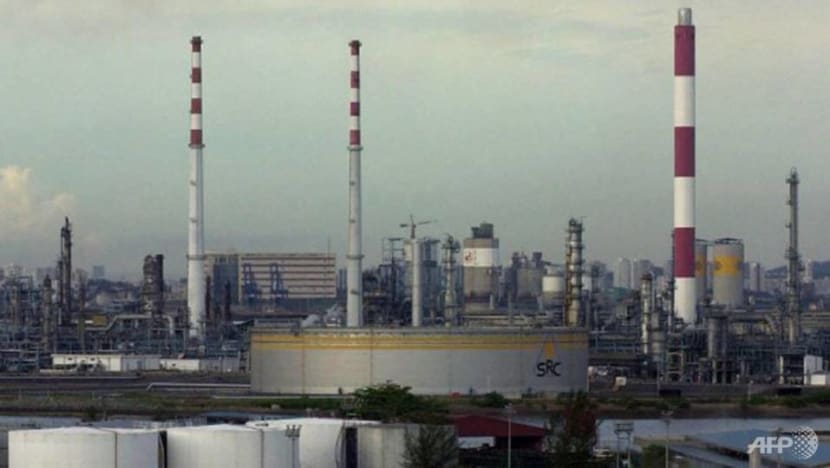- Joined
- Sep 22, 2008
- Messages
- 92,114
- Points
- 113
Singapore
ADVERTISEMENT
Singapore

Chemical refineries in Singapore. (Photo: AFP)
Listen
4 min

Erin Liam
03 Oct 2025 06:00AM (Updated: 03 Oct 2025 07:43AM)
BookmarkShare
Read a summary of this article on FAST.
FAST
SINGAPORE: ExxonMobil’s decision to cut up to 500 jobs in Singapore signals wider industry challenges from declining demand and rising supply, analysts said.
The US energy giant on Wednesday (Oct 1) said it plans to reduce 10 to 15 per cent of its workforce in Singapore by end-2027, calling it a move to improve competitiveness in an “ever-evolving landscape” and to "position the business for future success".
ADVERTISEMENT
The announcement followed a global restructuring plan unveiled a day earlier, which will see the company laying off 2,000 jobs worldwide, or 3 to 4 per cent of its workforce.
Analysts pointed out that ExxonMobil's cuts reflect broader challenges across the sector.
“It's a demand-supply story affecting international oil and gas companies,” said energy consultant Tilak Doshi.
“Crude oil prices are down, margins are down, revenues are down … So how do they respond to it? By cutting back.”
Other major US oil companies, including Chevron and ConocoPhillips, have announced job cuts this year, as Brent crude prices fell by about 12 per cent this year, driven by rising OPEC+ supply.
The sector is also facing weakening demand and overcapacity, particularly with the growth of petrochemical plants in China, said former Energy Studies Institute visiting senior fellow Leow Foon-Lee.
ADVERTISEMENT
Singapore is not insulated from these challenges, given its role as a regional refining hub, he said.
Beyond oil demand and supply, companies also face uncertainties from trade tariffs and pressures to restructure as artificial intelligence reshapes operations, said Mr Leow, who is also an adjunct professor at Nanyang Technological University's business school.
In May last year, Shell sold its Bukom refinery in Singapore – one of the world’s largest oil refining and trading centres – to Indonesian firm PT Chandra Asri and Swiss-based Glencore, having earlier announced plans to cut 500 jobs over three years.
Structural shifts in the industry are being driven by the global transition to cleaner energy, automation and stricter regulations, said Dr Roger Fouquet, principal research fellow at the Energy Studies Institute at the National University of Singapore.
ExxonMobil's Singapore layoffs highlight global pressures on oil and gas sector: Analysts
BookmarkShareADVERTISEMENT
Singapore
ExxonMobil's Singapore layoffs highlight global pressures on oil and gas sector: Analysts
The petrochemical sector is struggling with weakening demand, overcapacity and a global pivot towards cleaner energy, analysts point out.
Chemical refineries in Singapore. (Photo: AFP)
Listen
4 min

Erin Liam
03 Oct 2025 06:00AM (Updated: 03 Oct 2025 07:43AM)
BookmarkShare
Read a summary of this article on FAST.
FAST
SINGAPORE: ExxonMobil’s decision to cut up to 500 jobs in Singapore signals wider industry challenges from declining demand and rising supply, analysts said.
The US energy giant on Wednesday (Oct 1) said it plans to reduce 10 to 15 per cent of its workforce in Singapore by end-2027, calling it a move to improve competitiveness in an “ever-evolving landscape” and to "position the business for future success".
ADVERTISEMENT
The announcement followed a global restructuring plan unveiled a day earlier, which will see the company laying off 2,000 jobs worldwide, or 3 to 4 per cent of its workforce.
Analysts pointed out that ExxonMobil's cuts reflect broader challenges across the sector.
“It's a demand-supply story affecting international oil and gas companies,” said energy consultant Tilak Doshi.
“Crude oil prices are down, margins are down, revenues are down … So how do they respond to it? By cutting back.”
Other major US oil companies, including Chevron and ConocoPhillips, have announced job cuts this year, as Brent crude prices fell by about 12 per cent this year, driven by rising OPEC+ supply.
The sector is also facing weakening demand and overcapacity, particularly with the growth of petrochemical plants in China, said former Energy Studies Institute visiting senior fellow Leow Foon-Lee.
ADVERTISEMENT
Singapore is not insulated from these challenges, given its role as a regional refining hub, he said.
Beyond oil demand and supply, companies also face uncertainties from trade tariffs and pressures to restructure as artificial intelligence reshapes operations, said Mr Leow, who is also an adjunct professor at Nanyang Technological University's business school.
SHIFT TO GREEN ENERGY
Besides ExxonMobil, other oil giants in Singapore have cut back their businesses in recent years.In May last year, Shell sold its Bukom refinery in Singapore – one of the world’s largest oil refining and trading centres – to Indonesian firm PT Chandra Asri and Swiss-based Glencore, having earlier announced plans to cut 500 jobs over three years.
Structural shifts in the industry are being driven by the global transition to cleaner energy, automation and stricter regulations, said Dr Roger Fouquet, principal research fellow at the Energy Studies Institute at the National University of Singapore.
